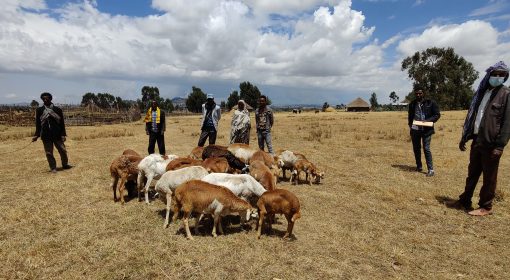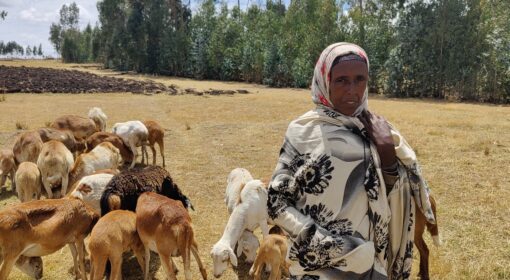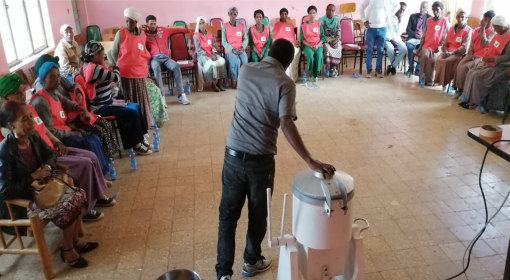By Girma Senbeta
In a watershed, everything is interconnected. The health of the soil and water supply directly impacts flora and fauna living in the watershed, affecting the human beings who depend on the watershed for their livelihoods. Healthy watersheds can provide many opportunities, but in Ethiopia, most people, including the Middle Awash region, rely on farming and livestock rearing. There is a missed opportunity to explore other livelihoods, leaving many communities affected by watershed degradation and less productive agricultural land.
The Biskelo-Worerso watershed, situated in the middle awash of the Oromia region, faces the familiar challenge of low agricultural productivity and rising input costs. Consequently, more people in the community are receiving aid, primarily through Safety Net Programs. The good news is that the government’s annual watershed restoration campaigns are slowly bringing about positive change in the area. However, the impact of such interventions often takes time to manifest fully, necessitating a mechanism that provides immediate benefits to the community during the more protracted restoration process. This mechanism is what the Green Future Farming project aims to establish. Through its innovative approach, the GFF project seeks to provide short-term and long-term benefits to the community, enhancing its ability to manage the watershed and achieve long-term development goals.
A new approach is being implemented to combat the degradation of landscapes by involving youth and women groups who have low incomes or are unemployed in Small and Micro Enterprises (SMEs). These groups can choose businesses directly related to landscape restoration, such as nursery development, small ruminant rearing/fattening, beekeeping, and homestead poultry. Once the groups meet the necessary criteria, they are officially organized as SMEs and receive legal registration, allowing them to access loans for their start-up businesses with accountability measures in place.
The youth and women groups are not only organized into SMEs but are also provided with training on basic business skills and technical knowledge specific to their chosen business. Currently, there are SMEs focused on small ruminant rearing, an SME on nursery development, and an SME on beekeeping in the Middle Awash area. To ensure sustainability, the project has allocated a small revolving initial capital for each SME, which must be fully repaid within a maximum of one year. Once repaid, the funds will be used to finance similar projects for the next group of SMEs as long as the watershed management intervention continues. This initiative benefits the current SMEs and creates a self-sustaining system for future communities.

In 2022, 83 SME members were organized in this approach and started their businesses. The nursery developer SME, with 23 members, started their business with 63,000 ETB (1100 euro) capital supported by the project and some materials from the agriculture office. The project has also provided them with an improved variety of onion seeds to diversify their business. Within a year, this SME has earned about 195,000 ETB (3400 euros) from the sales of different forest seedlings and onions. Unfortunately, security issues in this area did not allow sufficient technical support and follow-up for the nursery SME.

In the same year, seven SMEs were established for small ruminant husbandry and started their business, beginning with a total capital of 285.000 ETB (4979 euros). Out of these, two SMEs located in the highland area of the watershed invested 75.000 ETB (1310 euros) in purchasing 60 sheep, which have since grown to 92 in number. The remaining five SMEs located in the mid-land invested 210.000 ETB (3668 euros) in purchasing 126 goats, which have reproduced and increased to 151 in just six months. The group has reported that many sheep and goats are currently pregnant, but there were also seven deaths (five goats and two sheep) for various reasons. While some SMEs have expressed concerns about repayment due to negative experiences with NGOs, most small ruminant husbandry SMEs have successfully made their first instalment of the revolving fund payment. They are on track to repay their initial capital within the upcoming months fully.
A group of five individuals was organized as an SME for beekeeping. It provided ten modern beehives, two for each member, and necessary materials and training on transitional beehive production from local materials. The beneficiaries have successfully produced three transitional beehives each and anticipate their first harvest in May. Since beekeeping was introduced as a pilot project, repayment of the initial capital is optional. It is worth mentioning that the beneficiaries brought the bee colonies to the hives themselves.
The agricultural development agents in the respective kebeles and agriculture experts at the woreda and zonal offices play a pivotal role in the organized SMEs’ close monitoring and technical support. Experts have observed that the approach, which links job opportunities with watershed management, has spurred motivation within the community and has bolstered the government’s efforts in landscape management activities.
To create further job opportunities and benefits for the SMEs, efforts to link with additional sources of financing, such as micro-finance institutes and other potential funds like productive safety net programs, as well as establishing market linkages, should be prioritized as the next steps. Additionally, plans for organizing the subsequent batches of similar SMEs are underway.



